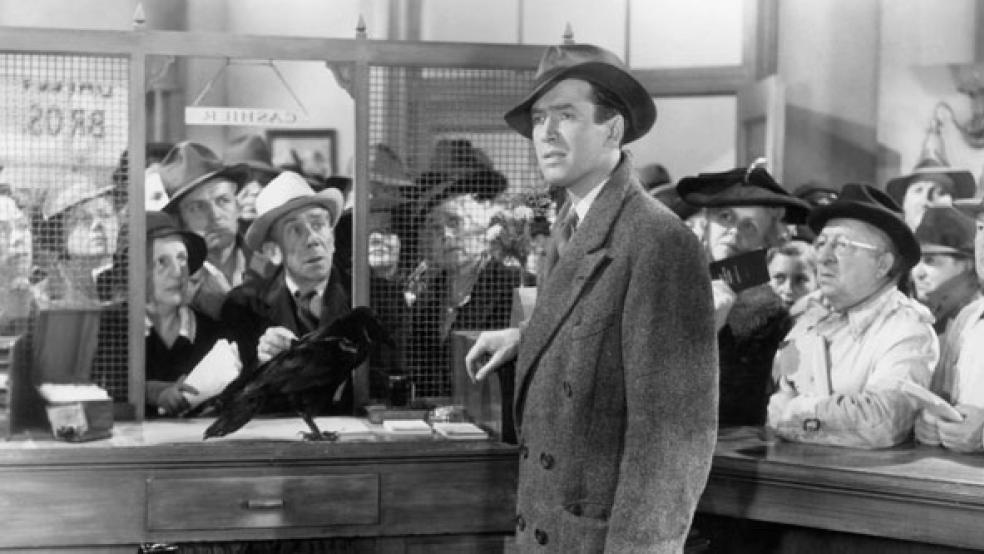Jimmy Stewart may be everyone’s ideal of the small town banker, but this year, for hundreds of community banks across the country, Christmas isn’t playing out like It’s a Wonderful Life.
To their great surprise, many small banks that were expecting to be exempt from provisions of the Volker Rule learned this week that they will face a tremendously expensive compliance challenge before the end of the year.
RELATED: FDIC PLAN TO COMBAT “TOO BIG TO FAIL” IS FLAWED
Executives at affected banks say that they are looking at unexpected charges that could wipe out as much as a full years’ earnings, diminish their capital, and reduce the number of loans they are able to make in their communities.
The Volcker Rule is designed to prevent large banks from making speculative investments that could endanger their solvency. Regulators indicated small banks had little to worry about, primarily because they don’t typically carry large investment portfolios.
But on Thursday, federal bank regulators issued the unwelcome news that a particular type of holding, collateralized debt obligations based on Trust Preferred Securities, or TruPS, would fall under the strict Volcker standard.
These holdings are basically a bundled set of long-duration bonds issued by other banks, and bankers who invested in them had assumed they would be exempt.
“We thought Volcker was a non-issue for community banks,” said Bob Fisher, president and CEO of Tioga State Bank in Spencer, NY. “This took all of us by surprise.”
RELATED: WHY JACK LEW IS KIDDING HIMSELF ABOUT TOO BIG TO FAIL
The bottom line for Tioga State Bank is that they will face a $1.2 million dollar hit from the rule – money that comes right out of profits.
“We were on pace to make about $4 million profit in 2013, so this is about 30 percent of that,” said Fisher. “Obviously that’s money that I don’t have to pay out in bonuses to my employees. It comes right off my bottom line. Potentially it’s money that is going to come out of my capital, so potentially it will limit my future loans.”
Fisher’s bank, which has 11 offices and about $390 million of assets, currently holds TruPS CDOs with a book value of $4.2 million. But under the Volcker Rule as regulators are interpreting it, the investments appear to be considered “covered funds,” and will have to be sold off.
This is a particular problem for banks like Fisher’s, which bought the securities it holds in 2007 and 2008. These CDOs are based on 30-year bonds, and the bank had planned on holding them to maturity. But because the law will force them to sell them off, they need to be marked down to their current market value, which means the bank is facing a substantial discount.
RELATED: VOLCKER RULE LETS BANK CEOs OFF THE HOOK
“If banks concluded they cannot hold these instruments, then the banks will have to write down their value and deduct that loss from capital,” confirmed Jaret Seiberg, a managing director with Guggenheim Securities’ Washington Research Group. “With less capital, these banks may be less able to originate the same number of mortgages. They also might need to replace the lost capital, which could cost them money. That would then get past along in the former of higher fee and higher rates on loans.”
Chris Cole, a senior vice president with trade group Independent Community Bankers of America, estimated that about 300 community banks around the country would take large hits to their profits because of the rule.
“When the proposal came out there was no idea that any community bank that owned a simple CDO in a trust fund – which is the way most community banks issue trusts –would be considered a hedge fund or a private equity fund,” he said.
The American Bankers Association president and CEO Frank Keating issued a statement expressing the group’s “dismay” at the regulators’ decision. “The consequences of this unexpected bureaucratic bombshell are millions of dollars in losses that will undermine affected banks’ ability to serve their customers and communities.
“We urge regulators to listen to the calls from affected banks and bipartisan calls from members of Congress to resolve this issue. We will continue to forcefully press our case until this unexpected and indefensible harm is resolved.”
Follow Rob Garver on Twitter @rrgarver
Top Reads from The Fiscal Times:





